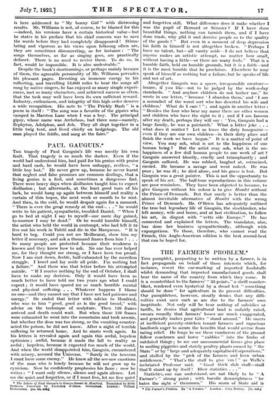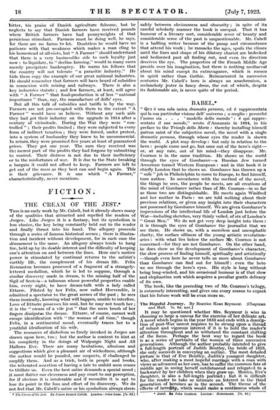THE FARMER'S PROBLEM.*
Tins pamphlet, purporting to be written by a farmer, is in fact propaganda on behalf of those interests which, for instance, resent the ear-marking of imported foodstuffs whilst demanding that imported manufactured goods shall bear the name of the country from which they come. It is a counterblast to the farmers' "33 points," a shrill counter- blast, rendered even hysterical by a dread lest "something should be done" for agriculture in its present difficulties.
Our pamphleteer, however, stoutly denies that any diffi- culties exist save such as are due to the farmers' own ineptitude. Not only will he hear nothing of subsidies or
tariffs, he denies that agricultural land is unfairly rated,
swears roundly that farmers' losses are much exaggerated, • and generally makes poor Giles "stand around." He sneers • at inefficient poverty-stricken tenant farmers and rapacious . landlords eager- to secure the benefits that would accrue from rating relief. He longs to see these cumberers of the ground follow coachmen and horse " cabbies " into the limbo of outdated things ; to see our uncommercial farms give place to smiling piggeries and stately poultry plants owned by "the State" or by "large and adequately capitalized Corporations," and staffed by the "pick of the farmers and keen urban middlemen." "That's the stuff to give 'cm ! " as Wells's inebriated Professor said. "Good thick slab stuff—stuff that'll stand up by itself ! Blow statistics . . . "
Statistics, one can understand, are not likely to be "A Farmer's" strong point ; with bucolic downrightness "be hates. the sight o' them:nun." His scorn of State aid is • The Farmer's Psalms. lSy "A Farmer." London : John Murray. Lis. wit./
bitter, his praise of Danish agriculture fulsome, but he neglects to say that Danish farmers have received pounds where British farmers have had pennyweights of that pernicious stimulant. Farmers must be doing well, he says, for there are no farms to let. Doubtless he would have no patience with that weakness which makes a man cling to his homestead at all casts, but "A Farmer" should understand that there is a very businesslike side to such loyalty just now : to liquidate, to " decline farming," would in many cases merely precipitate bankruptcy. He warns his fellows that the country will not tolerate "a parasitic industry." He bids them copy the example of our great national industries. He should remember that farmers will have heard of subsidies in connexion with mining and railways. There is also a key industries statute ; and few farmers, at least, will agree with "A Farmer" that food-production is of less "national importance" than, say, the manufacture of dolls' eyes.
But all this talk of subsidies and tariffs is by the way. Farmers are not pre-occupied with them to the extent "A Farmer" would have us believe. Without any such aids they had got their industry on the upgrade in 1914 after a century of vicissitude. During the War they were " con- trolled " ; their profits limited ; they were subjected to every form of indirect taxation ; they were forced, under protest, into a system of husbandry they knew to be uncommercial. In return, they were promised five years at least of guaranteed prices. They got one year. The sum they received was tilt merest part of the profits they had forgone by submitting to control. Their distress is not due to their inefficiency or to the misfortunes of war. It is due to the State breaking a bargain it could not afford to keep. Farmers are left to get out of the mess as they best can and begin again. This is their grievance. It is one which "A Farmer," characteristically, never mentions.















































 Previous page
Previous page